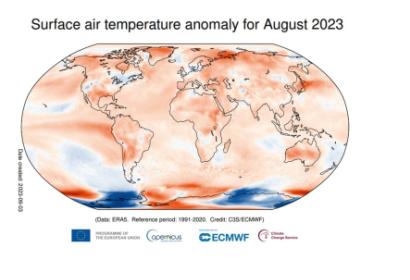Heatwaves, which can last for several days, impact societies and their livelihoods in many regions of the world. In August of the year 2003, a severe heatwave impacted Europe. According to the Meteorological Office of the United Kingdom (UK MetOffice), this particular heatwave was the worst one in the last 500 years (https://www.metoffice.gov.uk/weather/learn-about/weather/case-studies/heatwave). This summer heat wave in Europe, unfortunately, affected the elderly more severely, displaying their higher differential vulnerability with respect to people of younger age. In its 64th Newsletter published in September 2021, the Centre for Research on the Epidemiology of Disasters (CRED) of the Catholic University of Louvain (UCLouvain) noted that there were more than 72,000 people killed in Europe. The CRED report, focusing on extreme weather events in Europe, indicated that this heatwave accounted for nearly half of the disasters reported in Europe between the years 2000 and 2020. The CRED Newsletter can be accessed here.
Twenty years later, the World Meteorological Organization (WMO) of the United Nations and the Copernicus Climate Change Service, implemented by the European Centre for Medium-Range Weather Forecasts (ECMWF) on behalf of the European Commission, reported that the summer of 2023 was the hottest on record globally. In their press release of 6 September 2023, WMO and ECMWF reported that Earth had experienced its "hottest three-month period on record, with unprecedented sea surface temperature and much extreme weather". The WMO/ECMWF press release is available here. In its August Climate Bulletin of 5 September 2023, the Copernicus Climate Change Service highlighted that the 2023 summer was manifested in terms of high temperatures across Europe, marine heatwaves, and record-breaking sea surface temperature anomalies in the North Atlantic and in other oceans of the world.
More information from the Copernicus Climate Change Service regarding the weather and sea temperatures can be found in these links:
https://climate.copernicus.eu/summer-2023-hottest-record
https://climate.copernicus.eu/surface-air-temperature-august-2023
https://climate.copernicus.eu/record-high-global-sea-surface-temperatures-continue-august

